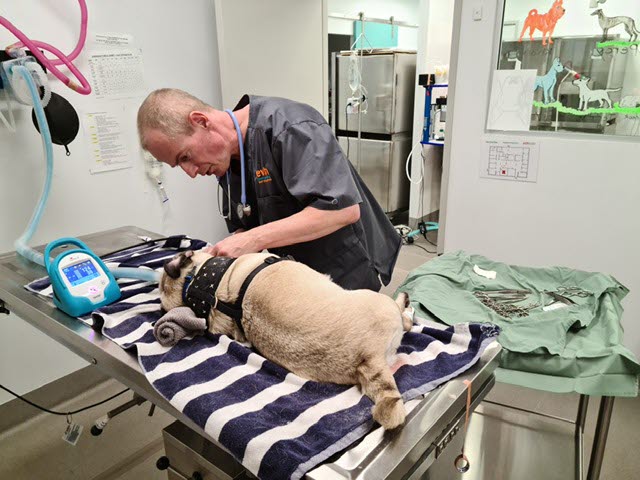Working as an emergency care veterinarian

Pictured above: Emergency veterinarian Dr Steve Reid treating a patient in the veterinary emergency hospital
If your pet is injured or suddenly becomes ill at night or during the weekend, taking them to an after-hours emergency veterinary hospital allows the pet to be assessed and treated by a veterinarian as quickly as possible.
Emergency veterinary centres are increasingly available in towns and cities across Australia, giving pet owners the peace of mind of knowing that veterinary help is available even when your local veterinary hospital may have closed for the day.
Similar to emergency doctors working in a human hospital ER, many veterinarians are employed working exclusively in emergency veterinary centres where they develop a career providing emergency and critical care for pets.
What is it like being an emergency care vet?
Veterinarian Dr Stephen Reid is part-owner and veterinary manager of EVH Emergency Vet Hospital in Perth, which is open every night of the year and open 24 hours on weekends and public holidays. Dr Reid works several nights a week in the emergency veterinary hospital seeing patients, and every other night he is on call to assist and support the other emergency veterinarians on his staff.
The unexpected nature of emergency work, combined with the support role he undertakes providing guidance to other veterinarians are what Dr Reid enjoys about working as an emergency care veterinarian. “In emergency the appeal is the change of pace, the unknown and the unexpected. All of which are very well suited to my personality. I find my role particularly engaging as I help with medicine, radiology and surgical advice.
“Within our hospital our veterinarians and veterinary nurses have different rosters depending on whether they are full-time, part-time or casual. I think it’s important to try and get a roster which works for the individual. Some of our emergency care veterinarians work one shift every week on the same night, others vary from casual shifts through to multiple nights in a row”, said Dr Reid.
Emergency care veterinarians see a wide variety of interesting cases, and by utilising specialised diagnostic equipment they are able to assess, treat and provide hospital care for the patients they see. “The most common presentation we see is for pets that are vomiting – which has numerous causes, followed by allergic reactions, diarrhoea, accidents and complications of managing chronic disease.
Busy shifts and the importance of clear communication
The shift load, duration and combination of cases can fluctuate. Sometimes there are runs of simple cases that are treated medically and sent home. Other times we’ve had over 20 cases with multiple critical patients in hospital. Some of those cases were on oxygen support, others hospitalised for further diagnostics and others going to emergency surgery”, said Dr Reid.
Mentoring junior staff is a large part of Dr Reid’s role, helping veterinarians and veterinary nurses with challenging cases and providing guidance on managing their time during the often busy night-time shifts. Dr Reid strongly recommends emergency veterinarians to de-brief after their shifts to maintain their well-being.
“We see some awful injuries so I suspect? it not an environment for everyone. We see fascinating cases, interesting people and it tests both you as a communicator and a veterinarian. Pet owners come to us understandably distressed. This stress places a significant burden on communication.
“As a veterinarian, I find being direct and honest my best strategy. If the outlook is bad, I do break that to pet owners, because I think it gives them time to start processing bad news. I still find to this day, that saving a patient is a very rewarding experience, and the pet owners are very appreciative”, said Dr Reid.
For those veterinarians wanting to pursue a career in the emergency and critical care of pets, there are opportunities to gain internships and new graduate roles at emergency veterinary centres. There are also further training options for veterinarians to gain additional or specialist qualifications in veterinary emergency care.
Things to remember if taking your pet to an emergency vet centre
Taking your pet to an emergency care veterinary centre may often be an unexpected and stressful situation due to the nature of the injury or illness to your pet. Dr Reid shared some advice for pet owners who may need to attend an emergency veterinary centre.
“Have somebody call ahead with a brief summary of what’s happened to your pet and your likely time of arrival. Bring a support person who can assist you so that you can concentrate on your pet, even if they’re just assisting you with driving during this often emotional time. Bring any medications that your pets may already be on.
“Please tell us if your pet bites, then we can be careful and sedate the pet if necessary to reduce stress – we do not want either of us bitten. Do not be too embarrassed to tell us if your pet ate any illicit drugs, human medications or garden poisons, we need to know these facts for treatment. You can be assured that we have probably seen it before”, said Dr Reid.
